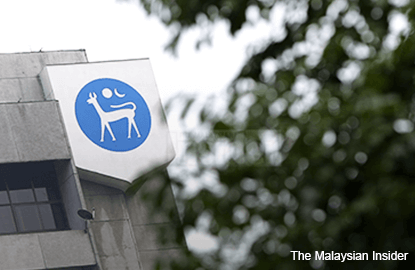
KUALA LUMPUR (March 23): The Malaysian economy, which is expected to grow at a slower pace of 4% to 4.5% this year, compared with 5% in 2015, will continue to be anchored by domestic demand.
The pace of expansion in domestic demand, however, is projected to moderate to 4.3% in 2016 from 5.1% last year, amid ongoing adjustments by consumers and investors to the challenging economic environment, said Bank Negara Malaysia (BNM).
According to BNM Annual Report 2015, private consumption growth is projected to trend below its long-term average to 5.1% in 2016, from 6% last year, as households continue to make expenditure adjustments in response to the lingering effects of the goods and services tax (GST) implementation, and changes in administered prices.
Additionally, household spending will be affected by weaker consumer sentiments due to uncertainty on labour market conditions, financial markets and ringgit performance. These adverse effects, however, will be partially offset by continued growth in income, employment and government measures targeted to increase households’ disposable income.
While growth in the first half of 2016 is expected to be more moderate, consumer spending is projected to register a gradual improvement, as the impact of GST lapses.
This improvement will be further lifted by the increase in the national minimum wage and the salary increment for civil servants effective July 2016. Consumption spending is also anticipated to be supported by higher crude palm oil and rubber prices, particularly spending by rural households.
Given the continued environment of uncertainty and the cautious business sentiments, private investment growth is projected to trend below its long-term average and grow by 5.5% in 2016, said BNM.
The environment of continued low commodity prices would affect capital expenditure in the upstream mining sector, particularly investment related to activity involving marginal oil fields.
Nonetheless, private sector capital spending will be supported by the implementation of ongoing and new investment projects, particularly in the manufacturing and services sectors.
Growth of public sector expenditure would also remain moderate at 2% in 2016, reflecting the government’s commitment to fiscal consolidation.
However, public consumption will continue to contribute positively to overall growth, supported by the continued expansion in emoluments.
Public investment is projected to turn around to register a positive growth of 1.1%. While the federal government has announced a scale back in expenditure and reprioritisation of development projects, the total spending on fixed assets would still be higher in 2016, compared with the previous year.
Public corporations, meanwhile, are expected to continue the positive investment momentum recorded in the second half of 2015, after registering negative growth since 2014.
This reflects the ongoing implementation of key infrastructure projects in diversified sectors, including in the utilities, transportation, as well as the downstream oil and gas sectors.
Meanwhile, the international economic and financial landscape is likely to remain challenging and will be a key factor that will influence the prospects of the Malaysian economy in 2016.
The strength of global economic growth and the trajectory of the global oil prices will have important implications for the growth of the Malaysian economy.
The Malaysian economy also remains affected by growth prospects of its key trading partners, conditions in the financial markets and the state of investor and consumer confidence.
Nevertheless, Malaysia will face these challenges from a position of strength, afforded by the country’s diversified structure, strong fundamentals and policy flexibility.